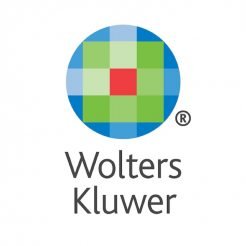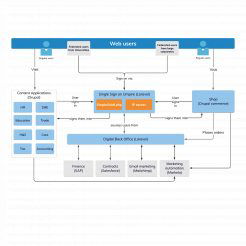Wolters Kluwer
Full Fat Things deliver a suite of content products, self service portals, ecommerce platforms and fulfilment and entitlement solutions for Wolters Kluwer’s product portfolio.

About Wolters Kluwer
Wolters Kluwer is a market leading global information services company with 19,000 employees whose information, software, and services help legal, tax, finance, and healthcare professionals in over 150 countries. Wolters Kluwer combine information and technology to help their customers’ quality and effectiveness, for example supporting 210,000 tax and accountancy firms worldwide; that’s 40 million tax returns!
The challenge
Wolters Kluwer's goal was to simplify the customer journey in accessing their suite of products. They wanted to refresh their products into one technology platform and move to a model where their customers can access their products across multiple devices.
Wolters Kluwer owned a collection of platforms that supported their product portfolio and wished to create new products for their markets from their vast content base. They were specifically interested in entitlement, authentication and customer self-management.
Our approach
Our first actions with Wolters Kluwer was to meet with the executive team and gain a better understanding of their products and business operations.
Full Fat Things initially gained the trust and understanding of the Wolters Kluwer executive team by meeting with product and IT stakeholders to map out business operations. We found what their current business processes were and what their requirements would be in the future. Their internal system maps were used to support the move to digital by ensuring the new build integrated directly with the right systems and supported their customers, wherever they are.
Product specific consulting deepened our knowledge of each area before each individual projects were started.
The first step was to remove legacy software. It was becoming expensive to maintain and hindered their product growth. Wolters Kluwer wanted to reinvigorate their technology and create a more efficient content management system, so modernising their software had to come first.
We migrated data from SAP, Broadvision, NXT, Documentum, and even legacy content stores based in Revision Control System (RCS). Wolters Kluwer now has the option to build their own content in a ‘shopping cart’ approach. Staff can select a number of categories, or libraries of information and tools, to sell content to their target market. Drupal enables this content management using their regular concepts.
Find out more about our software and website development for the publishing industry.
One central customer portal
The customer portal manages all entitlement and authorisation. This allows the flow of users from universities, large corporates and other single sign-on sources, whilst also providing single sign-on via SAML to our content applications.
We built the content applications in Drupal. We built the customer portal and single sign on system in Laravel. Drupal powers all of the content platforms, and all sign-ins took place as a result of SAML sign-in requests “assertions” from the customer portal. The customer portal is called “Digital Back Office” in the diagram.

Together, this enabled customers to access their own information, subscriptions and products, as well as purchasing new products. We built the first phase of the portal at the same time as the first customer-facing content application, so that Wolters Kluwer could iterate on each content application, delivering benefits to customers quicker and more often.
We successfully integrated with an existing Wolters Kluwer single sign-on system, called Ping Identity, before then replacing Ping entirely with open source software built upon Laravel and SimpleSAMLphp to lower cost and reduce enterprise software fees.
Large-scale migration
The content applications contain vast amounts of data – around 19 million documents. This huge database needed to be separated and simplified for an easier user experience. We wrote a large-scale migration of content from their various forms, such as Broad Vision, NXT, PDF, HTML and even RCS into Drupal.
We also migrated the customers records from the previous customer databases spread around the legacy product set. We additionally built an extendable IP access solution. This allowed people to get access to content on a recognised and permitted IP address, but continue to use it wherever they were, as long as they signed in back in at their office location from time to time. This allowed for more remote working for Wolters Kluwer customers who travel to their own customer locations – people like accounting auditors.
Content management
After the successful content migration, we focused next on their content management principles and processes, with the goal of developing a combined digital and print world in which Wolters Kluwer does business.
Today, students, finance pros, HR pros and a whole collection of other professionals alike use the 19-million-document content applications that we built. They are sold to international corporations, sole traders and everyone in-between. Even HM Revenue & Customs (HMRC), the UK Tax agency, purchased it!
To support their essential guidance offering, we built additional timesaving features. Users can fill in web forms to produce legal documentation and contracts. It has folder technologies, which means clients can store their clients information and cases in the platform, all using regular Drupal entities and modules.
While Wolters Kluwer was already selling dozens of products, they needed to simplify and merge their content into easier to understand packages. We curated the content into taxonomies so that Wolters Kluwer could choose and build selections into sellable packages at will.
SEO
We put Wolters Kluwer into the Google Flexible Sampling Scheme to get more content into Google search engines and increase their search footprint. This increased the subscriber rate. We partnered with Algolia search to provide real time faceted search results. Having a very fast search over many millions of documents is a real differentiator against competitor products, which often offer slow awkward search solutions.
We built a number of ‘finder’ tools, including: ‘Statute finder’, ‘HMRC Manuals finder’, ‘Legal case finder’ and ‘Legal standards finder’. These allow users to search content within the 19 million documents of the site to find legislative information. Drupal uses content metadata to power the lookup, so the site can deliver the pages customers need, quickly.
Outside of legislation we built many other tools, including contract creation tools, chemical database research apps, and integrations with eCPD applications to name a few.
The single sign-on system and digital back-office
Using Laravel with SimpleSAMLphp, we built an identity and entitlement (or licence) framework to handle subscriber access in a digital back-office. By integrating with Drupal, finance and contract systems it meant customers needed only one account to access all their product subscriptions.
This system also enabled newsletters to flow to Mailchimp from multiple Drupal content streams. It powered user reporting and kept private user data away from Drupal, where Umpire, the single sign-on system we built, federated customers for other organisations.
Have a burning question about this case study?
We'd love to hear from you! Get in touch to find out more.
Take a look at our software and website development for the publishing industry.